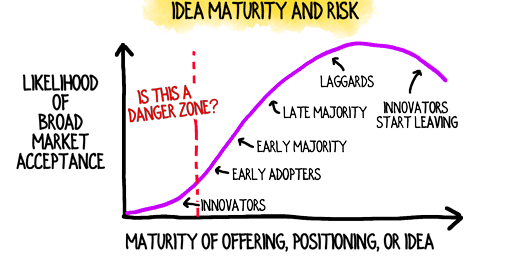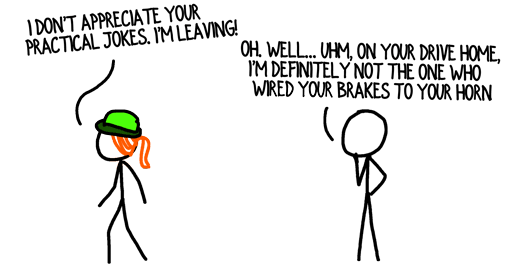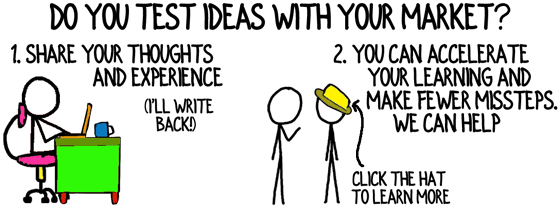You have an idea for a service your consulting firm could offer, or a new positioning you want to try out, or an edgy new filling for the croissants you send your clients and prospects.
How likely are you to offend potential consulting prospects by testing novel musings, outputs, approaches, and artifacts?

How much risk is there that you will permanently turn away high-potential business or, worse, create negative publicity for your consulting firm by experimenting in the market?
Virtually zero.
Too many consulting firms are afraid to go to market with half-baked ideas.
Be bold. Throw your consulting spaghetti against the market’s wall and see if it sticks.
Will potential prospects hold your wacky notions against you? No.
Will they be confused? Possibly. However, people don’t remember confusion, and it’s quickly dispelled by a strong, clear position.
Look, there are ways to burn bridges with consulting prospects.
If you betray your contacts’ trust, claim you’ll deliver something that you can’t, speak or act inappropriately, or surreptitiously tie their shoelaces together under the table, then you’ll rightfully lose the privilege of interacting with them.

Testing ideas, though, doesn’t put your consulting firm’s relationships in harm’s way.
In fact, the opposite is true.
If you’re candid about the fact that you’re exploring, experimenting and learning, you can strengthen your consulting firm’s bonds with your network.
Involving prospects in your testing signifies you trust them and they’re part of the “in crowd.”
Hence, every year—perhaps every quarter, test ideas with your consulting firm’s target market.
It’s quite likely many of your ideas will fall flat. That happens when you stretch your consulting firm. However, you’ll still end up in a stronger position.
What do you think?
Has testing ideas with your market while they’re still in development worked well for you, or have you crashed and damaged relationships with that approach?
Text and images are © 2024 David A. Fields, all rights reserved.

 David A. Fields Consulting Group
David A. Fields Consulting Group 

I consult under the banner of ‘partnership’. My dream situation is where client and I are trying something new and learning as we go. They bring the domain knowledge, I bring the framework, the specific analysis, and the implementation plan. Sometimes it even works!
Love the partnership lens for consulting, Brian. That’s a more fun, more rewarding way to operate your firm and, as you’ve pointed out, it creates a lot of space to experiment.
Thank you for sharing your experience, Brian!
In the midst of this right now and so far, while no takers, I have received positive feedback and some useful suggestions to improve idea. Open conversations, requests for insights seem to open time and doors.
Good on your, Bill, for being in the testing phase. You’re absolutely right that it opens doors. Your case study is very instructional and should serve as an inspiration for other consultants too.
Definitely since the pandemic I have piloted some new offerings and ideas. Like it has been for William, overall the response has been positive and it is a way to keep in conversation with clients and contacts.
Exactly right, Bette. Piloting ideas didn’t muddy your consulting firm’s position in the eyes of your clients; it created an opportunity to engage. Well done!
How does that old saying go? The one attributed to a secret chocolate makers guild dating back to the late Middle Ages — nothing ventured, nothing gained? I had a conversation earlier in the year with a client and did just what you propose above, David. I pitched a project idea that was far afield (yes, I chose that word on purpose) from our usual conversations. Much to my surprise, he was receptive. We have some work to do to actually close the business, but at least it is a possibility.
Great case study of letting the market tell you whether your experimental thinking is heading in the right direction, David. Double bonus points for puns and chocolate references, David.
(The medieval European chocolate makers guild is little-known. All outed members were burned at the stake, as their ability to forecast the power of chocolate before Europeans encountered the cacao bean was viewed as witchery. A warning for prescient consultants?!)